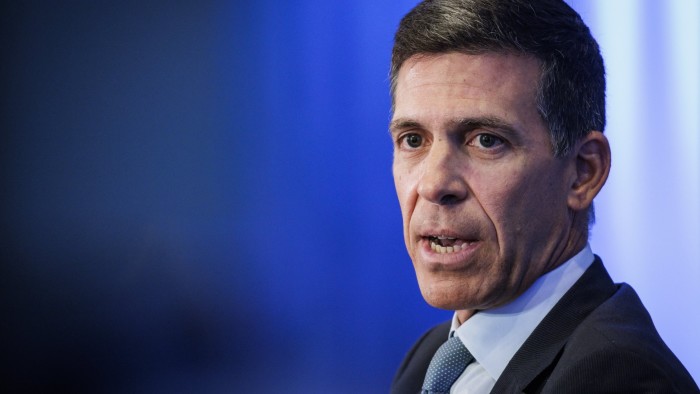Unlock the White House Watch newsletter for free
Your guide to what Trump’s second term means for Washington, business and the world
The Trump administration’s early trade deals could trigger a binary reaction from financial markets and determine how investors view the White House’s tariffs, Goldman Sachs president John Waldron said.
Wall Street has endured a volatile month, leaving investors split between those who contend that tariff deals with help transform the US economy and those who fear a recession is inevitable.
“Whatever emerges from those trade negotiations we hope will be pretty definitional. It may or may not be bullish, but it could serve as a template,” Waldron said in an interview with the Financial Times.
The comments from Waldron, widely viewed as the most likely successor to chief executive David Solomon, reflect anxiety on Wall Street about the administration’s progress in finding trade deals with dozens of countries.
President Donald Trump is in the early stages of a 90-day pause to many of the sweeping tariffs he announced on April 2 to allow Washington and other global capitals time to negotiate new trade agreements.
“The market is hyper-focused on those early trade deals,” Waldron said.
“The bull case is that we don’t have to debate trade after Labor Day, and we have across-the-board lower reciprocal tariffs and reduced non-trade barriers,” he added, referring to the September 1 US public holiday.
Waldron said he expected that the market’s focus would then shift from trade “to the fiscal picture and what the budget reconciliation will look like”.
Congress will negotiate a detailed budget in the months ahead after recently agreeing a budget resolution.
This first few months of the year have played out vastly differently to Wall Street’s early expectations of the Trump administration. Many executives expected Trump to pursue broad deregulation and tax cuts to boost the US economy and some Wall Street leaders talked in January of “animal spirits” revitalising investment banking activity.
Instead, financial markets have been upended by Trump’s sweeping tariffs, which have taken priority over most other policies. The uncertainty has damped dealmaking, though banks’ trading divisions have reaped huge gains from the market volatility.
Waldron said financial markets were “normalising albeit with more concern about the growth forecast” following a frantic start to April before Trump announced his pause on most of the tariffs. He said companies were holding off on making any major alterations to their operations until they could see what the result would be from the ongoing trade talks.
“Most people are making no changes because they are thinking, in 90 days you will know more,” Waldron said.
https://www.ft.com/content/13546a6a-56cb-41c6-b134-84d6c641b98e


